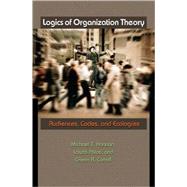
Note: Supplemental materials are not guaranteed with Rental or Used book purchases.
Purchase Benefits
What is included with this book?
| Preface | p. xi |
| Language Matters | p. 1 |
| Languages for Theory Building | p. 1 |
| Using Dynamic Logic | p. 5 |
| Partial Memberships: Fuzziness | p. 12 |
| Organizational Ecology | p. 18 |
| Unification Projects | p. 21 |
| Audiences, Producers, and Codes | p. 27 |
| Clusters and Labels | p. 29 |
| Seeds for Categories and Forms | p. 32 |
| Domains | p. 34 |
| Similarity | p. 37 |
| Similarity Clusters | p. 41 |
| Labels | p. 47 |
| Extensional Consensus | p. 52 |
| Complex Labels | p. 56 |
| Types and Categories | p. 59 |
| Schemata | p. 60 |
| Types | p. 65 |
| Intensional Semantic Consensus | p. 67 |
| Categories | p. 69 |
| Intrinsic Appeal and Category Valence | p. 71 |
| Forms and Populations | p. 78 |
| Test Codes and Defaults | p. 79 |
| Taken-for-Grantedness | p. 82 |
| Legitimation and Forms | p. 84 |
| Populations | p. 85 |
| Density Dependence Revisited | p. 89 |
| Delegitimation | p. 96 |
| Identity and Audience | p. 100 |
| Identity As Default | p. 101 |
| Multiple Category Memberships | p. 107 |
| Code Clash | p. 109 |
| Identities and Populations | p. 110 |
| Structure of the Audience | p. 111 |
| Nonmonotonic Reasoning: Age Dependence | p. 121 |
| A Nonmonotonic Logic | p. 123 |
| Beyond First-Order Logic | p. 124 |
| Generalizations | p. 127 |
| Nonmonotonic Reasoning | p. 130 |
| A Precis of the Formal Approach | p. 133 |
| Chaining Probabilistic Arguments | p. 142 |
| Closest-Possible-Worlds Construction | p. 143 |
| Falsification | p. 145 |
| Integrating Theories of Age Dependence | p. 150 |
| Capability and Endowment | p. 152 |
| First Unification Attempt | p. 157 |
| Obsolescence | p. 161 |
| Second Unification Attempt | p. 163 |
| Ecological Niches | p. 169 |
| Niches and Audiences | p. 171 |
| Tastes, Positions, and Offerings | p. 174 |
| Category Niche | p. 177 |
| Organizational Niche | p. 178 |
| Fundamental Niche | p. 183 |
| Implications of Category Membership | p. 186 |
| Metric Audience Space | p. 187 |
| Niches and Competitors | p. 191 |
| Fitness | p. 191 |
| Realized Niche | p. 193 |
| Niche Overlap | p. 194 |
| Niche Width Revisited | p. 198 |
| Convexity of the Niche | p. 203 |
| Environmental Change | p. 206 |
| Resource Partitioning | p. 209 |
| Scale Advantage | p. 210 |
| Market Center | p. 214 |
| Market Segments and Crowding | p. 215 |
| Dynamics of Partitioning | p. 220 |
| Implications of Category Membership | p. 226 |
| Organizational Change | p. 229 |
| Cascading Change | p. 231 |
| Identity and Inertia | p. 232 |
| Organizational Architecture | p. 235 |
| Cascades | p. 236 |
| Architecture and Cascades | p. 239 |
| Intricacy and Viscosity | p. 246 |
| Missed Opportunities | p. 248 |
| Change and Mortality | p. 253 |
| Opacity and Asperity | p. 256 |
| Limited Foresight: Opacity | p. 256 |
| Cultural Opposition: Asperity | p. 261 |
| Opacity, Asperity, and Reorganization | p. 265 |
| Change and Mortality | p. 268 |
| Niche Expansion | p. 271 |
| Expanded Engagement | p. 271 |
| Architectural and Cultural Context | p. 276 |
| Age and Asperity | p. 278 |
| Distant Expansion | p. 279 |
| Expansion and Convexity | p. 281 |
| Conclusions | p. 286 |
| Theoretical Unification | p. 287 |
| Common Conceptual Core | p. 289 |
| Inconsistencies Resolved | p. 291 |
| Theoretical Progress | p. 293 |
| Empirical Implications | p. 298 |
| Glossary of Theoretical Terms | p. 305 |
| Glossary of Symbols | p. 313 |
| Some Elementary First-Order Logic | p. 321 |
| Notation for Monotonic Functions | p. 331 |
| The Modal Language of Codes | p. 334 |
| Bibliography | p. 339 |
| Index | p. 355 |
| Table of Contents provided by Ingram. All Rights Reserved. |
The New copy of this book will include any supplemental materials advertised. Please check the title of the book to determine if it should include any access cards, study guides, lab manuals, CDs, etc.
The Used, Rental and eBook copies of this book are not guaranteed to include any supplemental materials. Typically, only the book itself is included. This is true even if the title states it includes any access cards, study guides, lab manuals, CDs, etc.